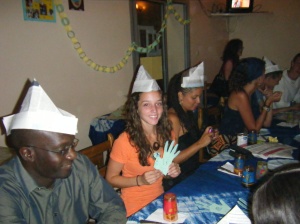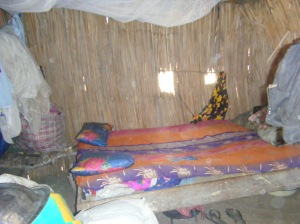So much to write about!!
So as I mentioned before, I’ve been looking to get involved with some of the humanitarian/development work that is happening here in Saint-Louis. There are a lot of organizations here such as CMVS, Plan Senegal, Medicos del Mundo, US Aid, and other names that are alluding me at the moment. I’ve seen other co-ops with Japan, Germany, Italy, Luxembourg, and Portugal. But even though there are so many groups working here, it has been rough finding one that will take a volunteer! For the most part all of the organizations that I mentioned are well organized, so they don’t really work in the more grassroots style of “hop on board.” When I met with the director of the Saint-Louis, Medicos del Mundo organization and I asked him if he had any need for un-paid help, he looked sort of confused and explained that they usually don’t work with volunteers, especially without a CV (I don’t have one of those yet! …although I have a resume, it’s not quite a CV and it’s definitely in English). So after learning this, I spoke with Cheryl another Rotary scholar, who shared with me similar experiences at other organizations she had spoken with…so were preparing for the worst when we went in to speak with the director of Plan Senegal (Saint-Louis), Mr. Sow. Undaunted, Cheryl and I met with the director at Plan Senegal (they work with children and mothers: pre-natal health, childcare, immunizations, vaccinations and a lot of integrated approaches for health education with the children and the moms). He explained that it would be possible to work with us, though we would have to write up what we would like to do/learn and the number of months we have to work. Paperwork which he would be send to headquarters in Dakar. For Cheryl…who is here for a total of 4 more months, this seems like a pretty viable option, although for me, (at this point I had a month and a half left), it wasn’t really that great of an idea considering the length of time things take here.
For example:
Cheryl and I attempting to meet with the director was a funny process. We set up the meeting two weeks in advance. We went to the meeting at 10:00am. We found out Mr. Sow was ill, so the guard told us to come back the next day..which we did, same time. We waited, and waited. The guard told us Mr. Sow was on his way from Dakar, that he would be there soon. Around 12:00pm, Cheryl had to go to class, so I continued to wait. Then I asked if there would be a better time to come around. He told me maybe he would be in by 3:00pm Haha! What?! How far away was he? I’ve learned that here people don’t like to give bad news, so they try to give you some hope, even if it’s might seem slightly misleading. Like for me, I would rather hear, “he just left Dakar, you should come back at 4:00pm” or something like that. But I’ve noticed that in situations like these, most people will tell you “he’ll be here soon” and just have you wait for as long as you’re willing to wait and then you say when it’s been too long, and you decide that you’ll come back. Rather than them being the ones to tell you that you need to come back.
So I come back at 3:00 (with Cheryl at this point). Then he tells us that Mr. Sow is tired (understandably so, it’s at least a 4 hour drive), and if we can come back tomorrow. At this point, we are a little frustrated, but not visibly so and we decide to come back tomorrow, same time. Thankfully it works out the next day. But it was quite the process!!
So I have decided to try another route. I talked with Rotarian Yves L’amour, here in Saint-Louis, and I explained to him that I am looking for contacts with some of the non-profit organizations. I had been hoping to work with children, and in some way address the problems of the street children. He put me in contact with Claude (I can’t even begin to spell her last name…), a French woman who runs a center for children on the island. It’s called, Centre La Liane – Hébergement de Jeunes Vulnérables. La Liane is a center for children who have limited or no prospects. At the moment there are 18 boys who live in this center, from ages 5 to 17. Some of the boys go to school, others do not. Some of the boys have families which keep in contact with them, while others aren’t that lucky. Many of the boys are Talibé (tah-lee-bay). Here is a short synopsis of a problem afflicting Senegal and West Africa involving the talibe system:
Child beggars are one of the most recognizable images of poverty in Senegal. Most are young boys, called talibés, usually between the ages of 7 and 15, often barefoot, wearing ragged clothes, carrying red tomato cans and asking for food and money. Talibés in Senegal are sent by their families to Qur’anic schools (called daaras) to learn the tenets of Islam. Though occasional begging was always a part of a talibé’s education as a means to teach humility, in recent years, talibés in urban centers spend increasingly more time on the streets begging, instead of in the classroom learning.
Talibés in urban centers often face unacceptable living conditions. Not only do they spend long hours in the streets, but they frequently suffer from malnutrition, dehydration, and skin diseases. The daaras are often unsanitary places and children are left unattended for long periods of time. The daara system has devolved from one providing sound religious instruction to a socially accepted form of child exploitation
While religious study is simultaneously an honor and an expectation, many poor families send their young boys to daaras because they simply cannot afford to support them at home. Unlike other religious educational institutions, these Qur’anic schools neither charge tuition for their students, nor do the schools have a source of income other than begging. Today, over 100,000 talibés are studying in cities across Senegal, often hundreds of miles from their families.
When the daara system was first established, families would send young boys to a daara within the community or in a neighboring village. Talibés’ families would then financially support the marabout (the religious teacher who runs a daara) in exchange for religious education for their children. Communities provided necessary services for the daaras and so the schools were initially dependent on and responsible to the local people. The close proximity of daaras enabled families and talibés to remain in close contact as the talibés could return home for meals, to bathe, and to do laundry. T he young children thus received the affection and connection with family that every child needs. Talibés were only sent to beg with the purpose of learning humility, and not on a daily basis to provide money for the marabout.
Migration of Talibés to Urban Centers
Over time, the daara system changed as marabouts migrated to major cities. Once in cities, far away from talibés’ families, marabouts lost their means of support. Increasingly, marabouts sent talibés out to beg to collect funds to sustain the daaras.
Child begging has now become a primary source of income for some marabouts. While it would be inaccurate to say that all marabouts deliberately take advantage of talibés, it has become common practice for them to send talibés to beg for long periods of the day—with the hours spent begging far exceeding the hours spent studying. In some cases, the boys face corporal punishment if they fail to collect a certain amount of money per day.
(http://www.tostan.org/web/page/694/sectionid/547/pagelevel/3/interior.asp)
I took this from the Tostan website. They have a project in Dakar which addresses these issues.
La Liane is non-religious and is solely interested in raising awareness of children’s rights. Also, it is worth noting that not all street children are talibe, and nor are all talibe abused (it is a system used throughout the world), but the Daara system in West Africa is particularly known for exploiting and abusing children.

La Centre la Liane Maison d'accueil et d'hebergement
At the center, there are 18 boys lodging, but the doors are also open during the day to any of the Saint-Louis street children. The idea is that they have a safe place to play and visit, and on certain days, eat breakfast (bread and milk is handed out on certain days of the week), wash their clothes, and participate in some of the activities that go on at the center.
I have only been there a short while, but it has been an amazing experience already! The boys are so silly and happy despite the obstacles they face. Also, the teachers that work there are really dedicated to the cause of children’s rights. I am going to bring my camera this week to take some pictures. There is this one little boy named Alph who is absolutely adorable! He is 5 years old and so calm. He’s like an old man in a little boy’s body. I’ll be sure to point him out in the photos : )

Mon ami, Alpha : )
If I thought I was busy before I started on this project, now I’m SUPER busy! I am literally meeting myself coming and going at certain parts of my day. Along with work and classes, I have been working on side projects that have come up in the last two weeks. I wrote up a short essay for Projects Abroad, along with trying to help out a friend who is seeking financial aid for his schooling (this is still in process). On Monday I am going to be giving a presentation at Lycee Ameth Fall, an all girls’ school, about life in the U.S., particularly Saint-Louis (the interest is Saint-Louis to St. Louis). This is part of “Sister Cities Saint-Louis” project, and I am sort of working as the liaison while I am here. This will be my first meeting with the girls. The amazing thing is that I found out my host mom is a director at this school and she knows the teacher of the class! I thought this was cool.
I’ve also been working with our Rotary Club here. They want to potentially fund a project called Bridge-Kids, and I’ve been helping out with the English as it is a project that a US Rotary Club invited our club to join in on.
Whew!!! So much!!
I’m trying to just take it all in. Time is going by really fast. This weekend I just decided to not do anything and spend some time with my family as well as hopefully get some administrative things done (for when I’m back home). It’s been a nice break, and I’m ready to head into another crazy week : )
Read Full Post »











